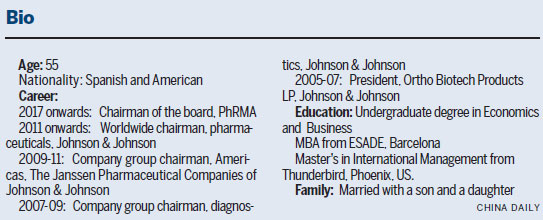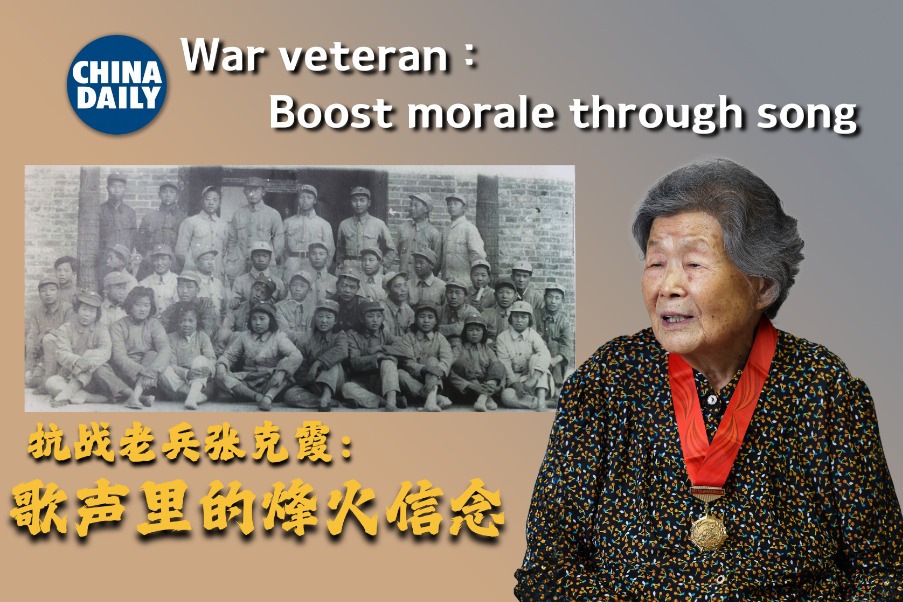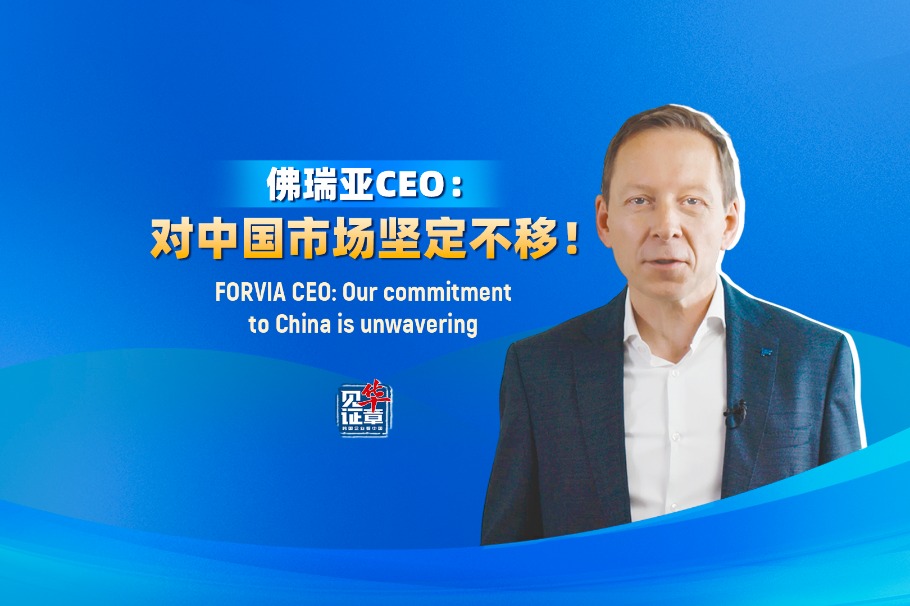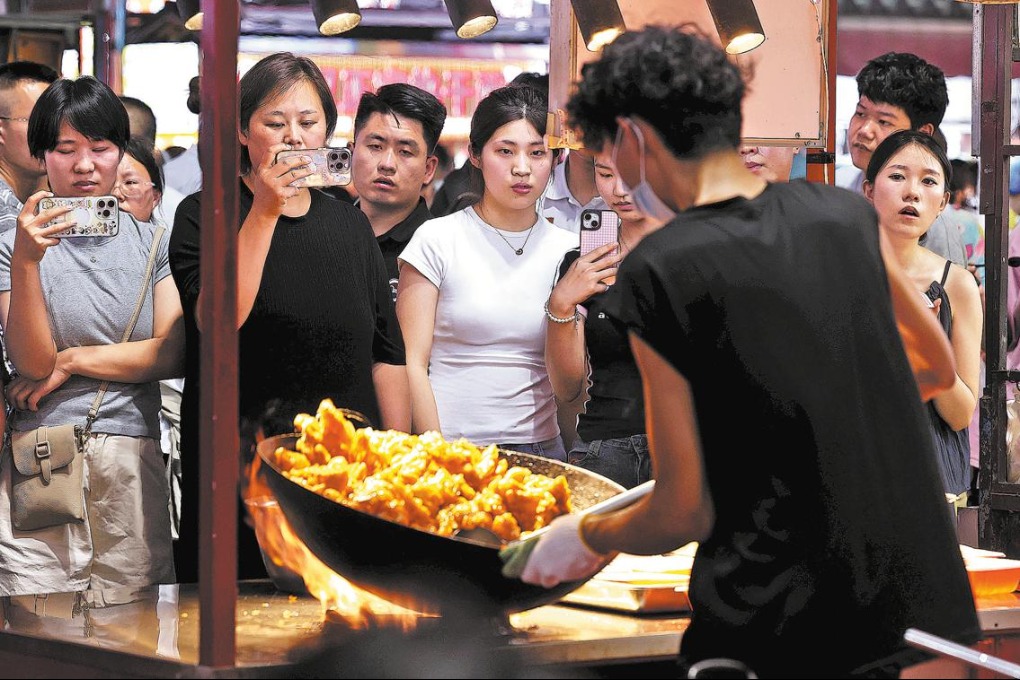Leadership is a different ballgame

Senior Johnson & Johnson executive, who once dreamed of being a tennis star, talks about the group's strategy for continued success in China and the rest of the world
As a child, Joaquin Duato had dreams of playing tennis for Spain.
At 55, he is now the executive vice-president and worldwide chairman of pharmaceuticals at blue chip brand Johnson & Johnson.
"I'm an avid tennis player and as a child I used to dream of one day representing Spain," he says during a visit to Beijing.
| Joaquin Duato, executive vice-president and worldwide chairman of pharmaceuticals at Johnson& Johnson. Provided to China Daily |

Instead, he has represented the global healthcare giant for the past 28 years and helped shape the multinational's strategy in China and across the world.
"The healthcare and pharmaceutical industries have developed notably in China during the past three decades," Duato says. "Pharmaceutical companies are getting medicines to patients faster than they were before."
Moves by the China Food and Drug Administration to streamline the approval of new medicines have opened up the industry, along with updating the National Reimbursement Drug List.
Last month, the Johnson & Johnson subsidiary, Xi'an Janssen Pharmaceutical Ltd, was granted approval from the CFDA for its Imbruvica capsules, which are used to treat adult patients with chronic lymphocytic leukemia and mantle cell lymphoma.
"These factors have improved the situation in China for innovation-based pharmaceutical companies," Duato adds.
With more than 125,000 staff in nearly 60 countries and regions, Johnson& Johnson sells its such as consumer and healthcare products, pharmaceuticals and medical devices, in about 200 nations and regions.
Naturally, China has become "vitally" important to the United States-based group.
In an interview with China Daily, Duato talks about the company's vision, its strategy in China, and his love of tennis and giant pandas.
What are Johnson & Johnson's plans in China for the next five years?
China is vitally important to us globally and we remain committed to investing in China, and making a significant contribution to the country's economic growth.
Since establishing operations here in 1985, we have expanded our presence significantly and today employ more than 2,500 people in our Beijing headquarters, our state-of-the-art manufacturing site in Xi'an and our research and development operations. These include the groundbreaking R&D center in Shanghai and the Johnson & Johnson Innovation Center.
Following an investment of $290 million, our new supply chain hub for innovation in Asia is scheduled to open in Xi'an (in Shaanxi province) in 2019. The objective is to serve the rapidly expanding needs of China and other markets in the region. The plant is expected to set a new standard in pharmaceutical manufacturing here.
At full capacity, the plant is expected to produce 400 million tablets, capsules, creams, suppositories and powders a year.
What are your priorities in the country?
Globally and in China, our strategy is to focus on discovering and developing transformational medical innovations for patients in six high priority disease areas, which address major unmet treatment needs.
These include oncology, immunology, neuroscience, infectious diseases, cardiovascular and pulmonary hypertension.
We will (also) continue to support China's aspiration to become a leading global pharmaceutical innovator through forward-looking investments. This will enable the discovery of game-changing therapies which address unmet medical needs.
What business opportunities will emerge through the Belt and Road Initiative?
Xi'an Janssen was, and will continue to be, a forerunner in establishing joint ventures with local partners in China. We established our operations in Shaanxi province in 1985, a critical area of the Belt and Road Initiative.
We also attribute these joint-venture partnerships and our continued investment in Xi'an as critical factors to our success in China. We will continue this model (in the future).
What is your biggest achievement here?
I am proud of guiding the business toward a greater focus on transformational medical innovations for patients.
Zytiga, a new kind of treatment for men with (a type of) prostate cancer, is a great example of cutting-edge science and true medical innovation that significantly prolongs lives.
How will you compete with competitors across the world and in China?
In 2011, we made the decision to focus our business on identifying and bringing transformational medical innovation. We are an innovation-based company which globally spends 50 percent more on research and development than on sales and marketing.
With a growing core business of medicines and a strong lineup of innovative products expected to launch or file during the next five years, we are leading the industry in advancing the health of patients around the world.
With our proven global commercial capabilities, we are well-positioned to continue delivering strong, long-term, sustainable growth.
How does digital technology affect your business?
Digital technology is important in discovery and development because we use information technology to screen targets and to model our clinical trial designs.
It is critical in manufacturing as we use machine learning and artificial intelligence, or AI, to identify areas in which we can eliminate waste and establish better quality control measures.
We now have access to vast amounts of data about how our medicines are used by physicians and patients once they are on the market. So this helps us better understand the risk-benefit ratio.
What makes an effective leader of a major multinational company?
I am proud to have worked at Johnson& Johnson for more than 28 years. I have had a varied career in different sectors of the healthcare industry, and in different countries and regions around the world. This has helped me continue to evolve and adapt my leadership style.
For the first half of my career, I was based in Europe and I was successful by using a direct, straightforward leadership style. But after moving to the United States I had to re-evaluate my style and learn to navigate cultural differences.
I would say my key leadership approach is adaptability - being able to draw upon what best suits the situation and the team I am leading.
How has your style changed over time?
Different business challenges need different leadership styles. When I became the head of our North American operation, I had to work quickly and alone to guide the business through a challenging turnaround.
But once it had stabilized, I had to open up to a more inclusive and consultative leadership style as we developed a long-term strategy for growth.
How do you handle setbacks?
I view setbacks as opportunities to grow, both as an individual and as a business. The challenges and hardships our group faced during the 2007 recession can almost be seen as a necessary step in achieving the remarkable success we have today.
The setbacks we faced forced us to make our organization a leaner and more focused operation. Our extremely successful model of embracing innovation was born.
So now, whenever I am faced with a setback, I always look for an opportunity that might arise.
What are your hobbies?
My role involves a lot of travel, so whenever I am at home my first priority is spending time with my family. I love being with my wife, son and daughter.
This summer, I have spent a number of days traveling with my family to visit potential colleges that my daughter might attend next year.
I am also an avid tennis player and as a child I used to dream of one day representing Spain.
How do you spend your free time in China?
Usually, I am focused on meetings with customers and government officials. But I understand that through our collaboration with Shaanxi Rare Wild Animals Rescue and Research Center, which aims to further protect the giant panda in China, we had the honor of naming a baby panda "Johnson & Johnson". If I have free time, I am hoping to visit him.
zhongnan@chinadaily.com.cn
(China Daily European Weekly 09/15/2017 page31)
Today's Top News
- China's railways hit record 2.24 billion passenger trips in H1
- Collection of Xi's articles on education, other two books published in Hong Kong
- Local govts urged to improve handling of hot spot issues
- China hailed as stabilizing global force
- BRICS currency creates dilemma for the dollar
- Climate not a contest for China, US































